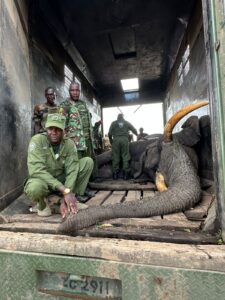There was little rain in the months of June and July, which paired with local farmer’s harvesting ripened crops, lead to the 78 human-elephant conflict incidents MEP responded to over the last two months. That’s the highest number in a two-month period we’ve ever had! We can report five elephant carcasses in June and July, three of which were a direct result of conflict.

CEO Marc Goss using the Karen Blixen Camp Ree Park Safari helicopter to move an elephant out of a farm.
Mara Elephant Project is taking action to mitigate human-elephant conflict and reduce elephant deaths! In June and July we established a new ranger base, gathered intelligence that led to the recovery of 78 kilograms of ivory and two firearms, erected and maintained a chili fence, collared a new elephant and extended our partnership with Tanzania National Parks (TANAPA) into the Serengeti.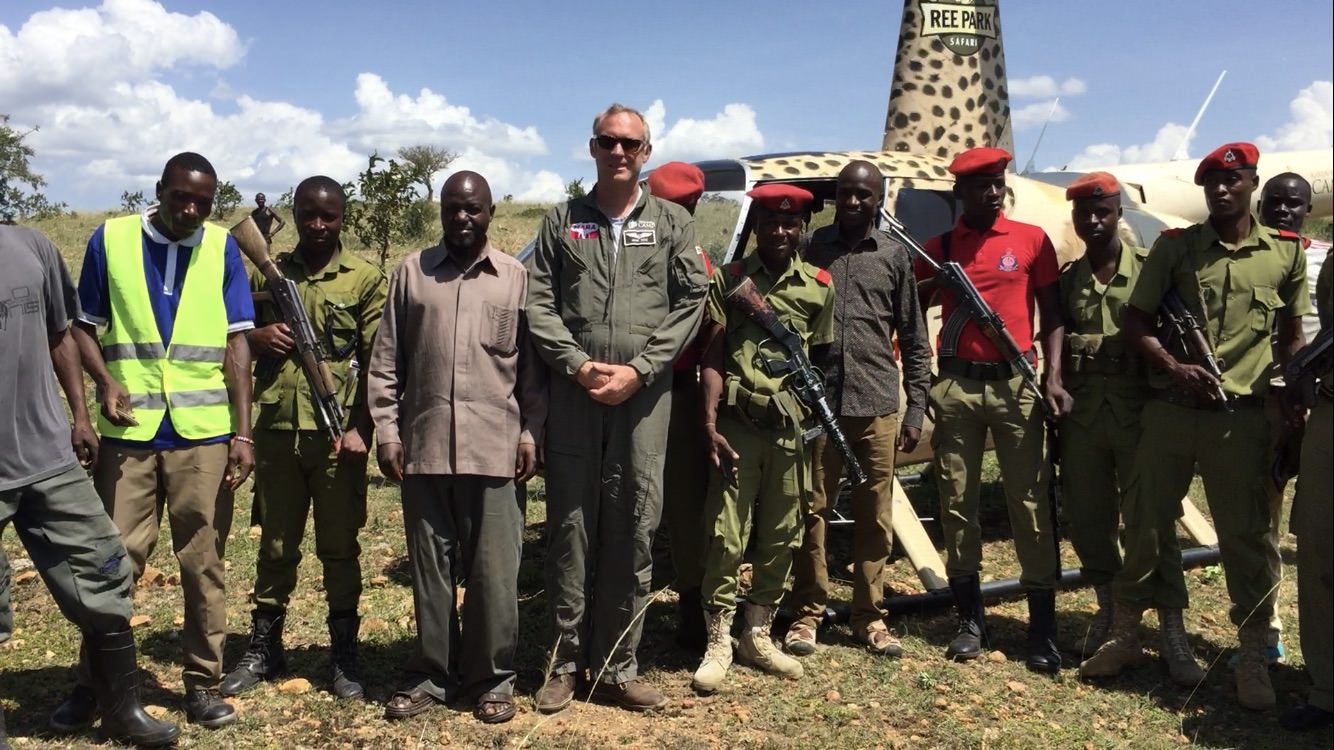 CEO Marc Goss with TANAPA rangers.
CEO Marc Goss with TANAPA rangers.
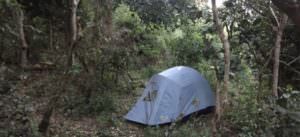 The new ranger base is located in the Isokon area of the Transmara where they’ve been experiencing nightly crop raiding by elephants. Large herds of elephants have been moving out of the protected areas and up the escarpment via well-established corridors into the farms. MEP CEO Marc Goss camped out with rangers (pictured) in this area for several nights to be able to keep the Karen Blixen Camp Ree Park Safari helicopter nearby. Being based at the camp saved significant ferrying time back and forth between camp and MEP HQ. We used the helicopter to push the elephants deep into the Mara Conservancy so that they were less interested in traveling a long distance to crop raid the farms at night.
The new ranger base is located in the Isokon area of the Transmara where they’ve been experiencing nightly crop raiding by elephants. Large herds of elephants have been moving out of the protected areas and up the escarpment via well-established corridors into the farms. MEP CEO Marc Goss camped out with rangers (pictured) in this area for several nights to be able to keep the Karen Blixen Camp Ree Park Safari helicopter nearby. Being based at the camp saved significant ferrying time back and forth between camp and MEP HQ. We used the helicopter to push the elephants deep into the Mara Conservancy so that they were less interested in traveling a long distance to crop raid the farms at night. 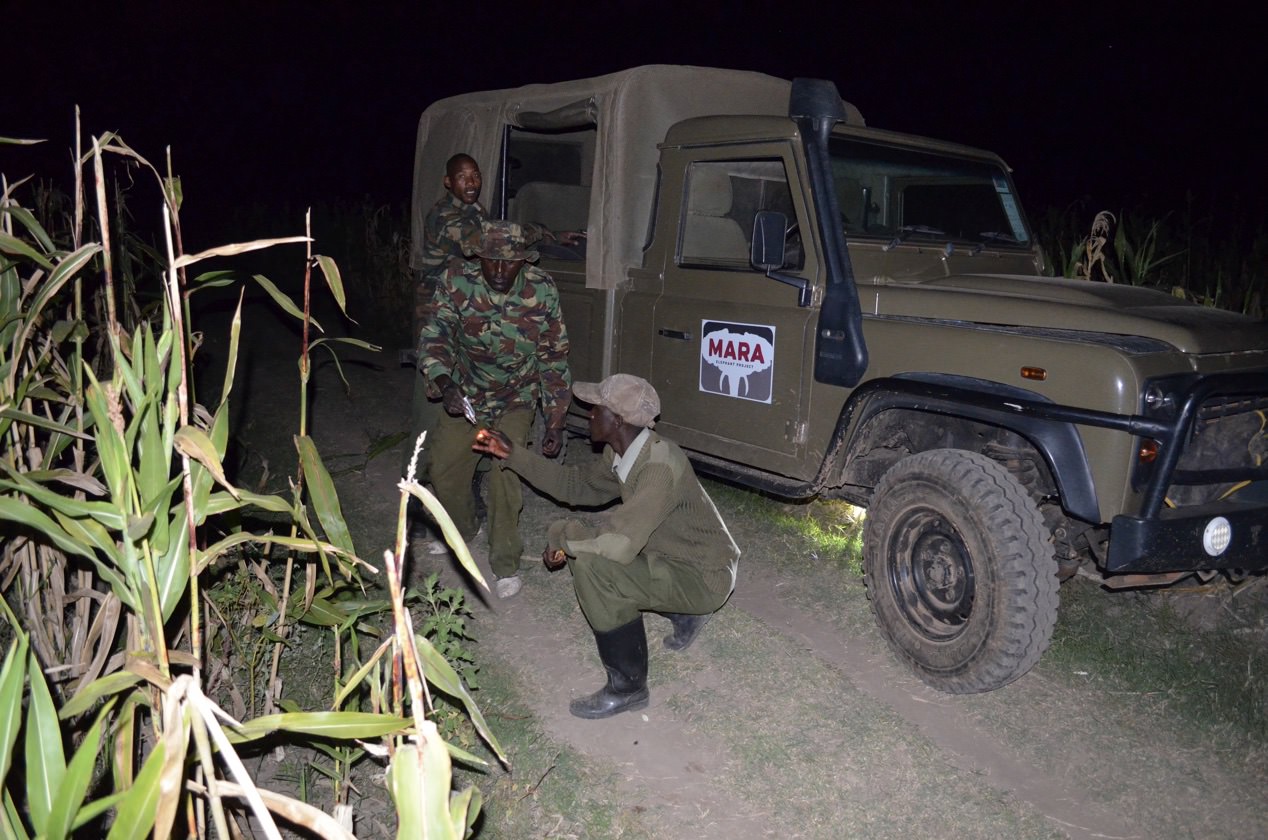
The new David Sheldrick Wildlife Trust vehicle continues to be an essential tool for MEP in HEC situations.
Loita continues to be a problem area for MEP. The thick cover and lack of access roads makes it easy to miss poachers and elephant carcasses when we are on patrols. We sent our reconnaissance team to Loita twice during June and July. When the team goes to Loita they are responsible for following elephants, arresting illegal loggers, responding to conflict and gathering intelligence from the community and informants, which is what lead to the most recent arrests.

On July 6, we got an intelligence report of suspects with four pieces of elephant ivory to sell in the Olkarin area in Loita. The same afternoon we deployed the MEP/Kenya Wildlife Service (KWS) rapid response team from the MEP HQ to lure out the ivory dealers and arrest them. Two suspects turned up at the open plain rendezvous with their ivory (pictured). Three of our team members approached them over the open ground on a motorbike. As soon as they met up they made the arrest. Unfortunately, one got away. The team gathered some good intelligence from the suspect at the KWS HQ in Ewaso Ngiro. The tusks we recovered were quite fresh which makes us suspect they are from two of the poached elephants we discovered earlier in the year.
During the second operation, we attempted to lure out a renowned poacher who was using a .375 caliber hunting rifle to kill elephants. Unfortunately, the suspect became very cagey and fled the scene, but he left behind 13 kilograms of ivory with the informant. The Loita team also stopped two illegal logging outfits and recovered a large amount of podocarpus timber, which was donated to the local primary school under the authority of KWS.
We would be remiss not to acknowledge the help of Rob and Sarah O’Meara, whom have been very supportive in the Loita area and have provided a base of operations and accommodation for our rangers in the area. They have also built a close relationship with the community and continue to develop the community woodworking and bee keeping skills in the area. The CEO and MEP Chairman visited their camp in July and the forest surrounding the area is nothing short of magical.
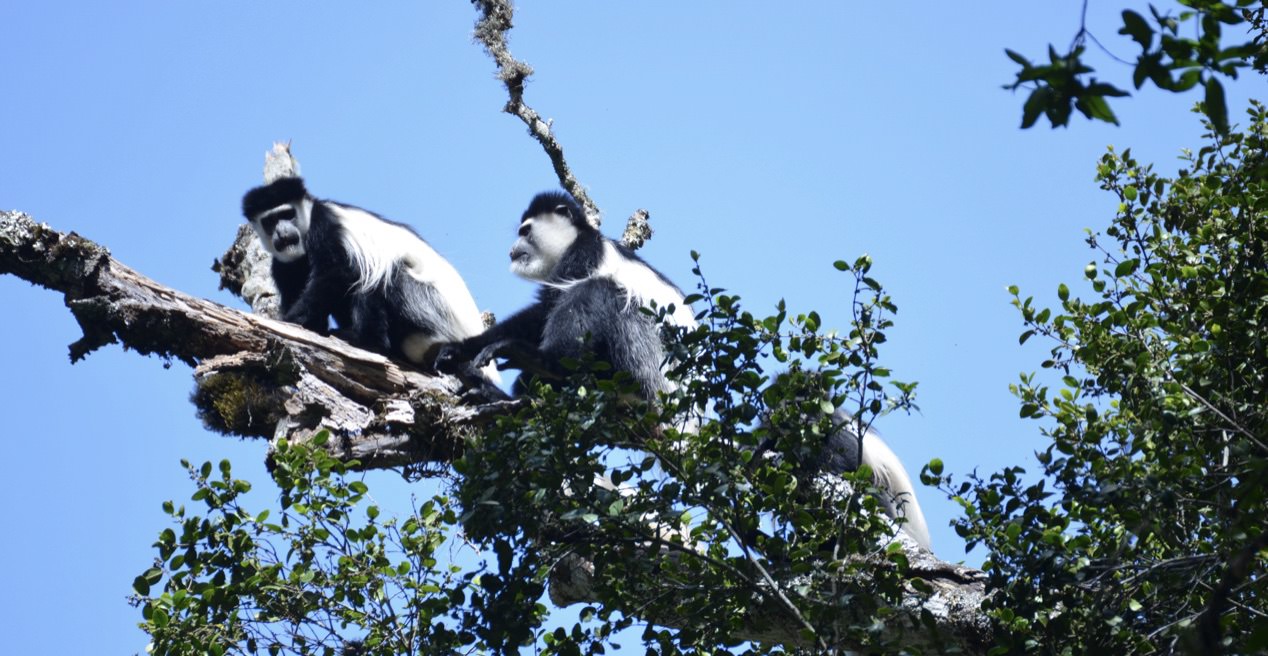
Monkeys in the Loita trees.
Our partnership with TANAPA continues to progress. On July 17, TANAPA arrested three suspects in Olosokwan Village in Tanzania, which is right outside of Loita, based on MEP intelligence. They recovered 46 kilograms of ivory and two dangerous firearms. In addition to this, we’ve been approved by TANAPA to collar an additional 10 elephants in the eastern Serengeti. This area is especially important because of the high level of human-elephant conflict that occurs here. We’ve been working with RESOLVE for several years on using unmanned aerial vehicles (UAVs) in this area, because until recently Kenya outlawed UAVs. Our relationships with TANAPA continues to be important to MEP in terms of expanding our area of operation, reducing human-elephant conflict and rooting out poaching operations.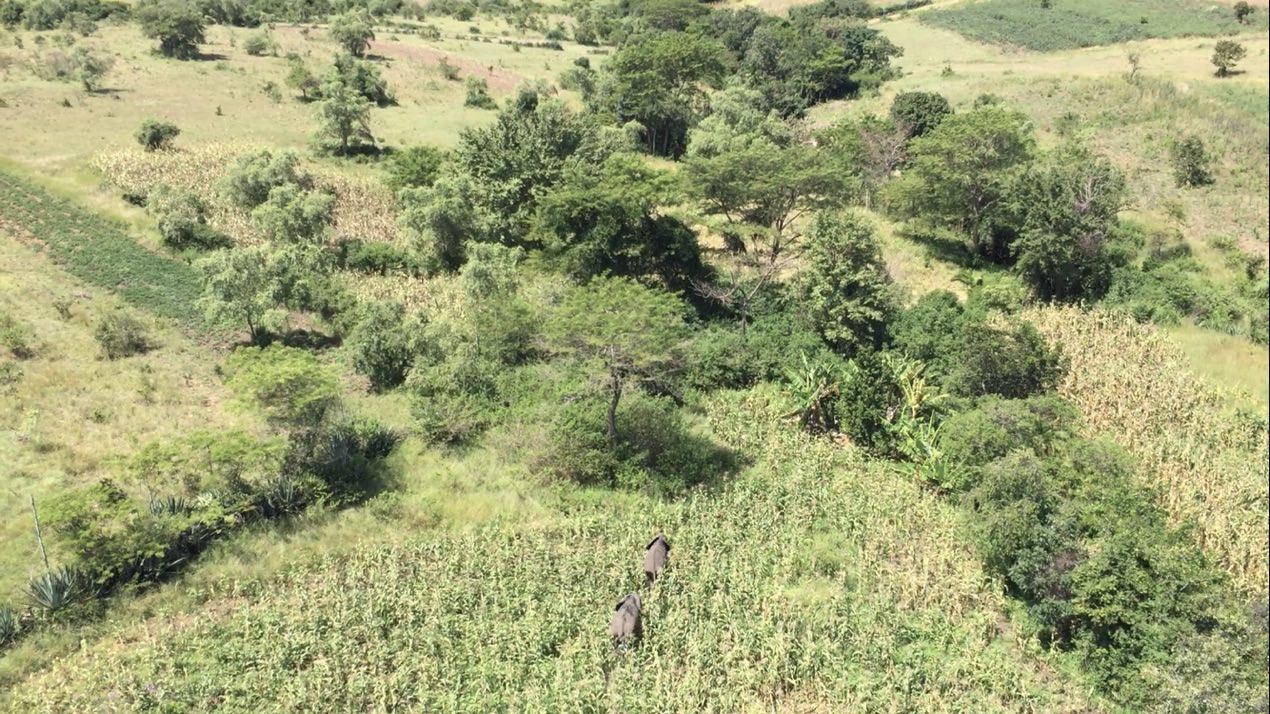 Elephant crop raiding in Tanzania.
Elephant crop raiding in Tanzania.
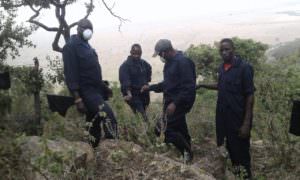 In the Munyas area elephants have been using the nearby Laila Forest to stage crop raids at night. The most recent chili fences we erected (pictured) in this area have been effective in keeping them out for the most part. During this reporting period, we did have a bull force his way through the fence and was killed as a result of conflict. In response to this we built more fences along elephant corridors which do seem to be working. The local farmers are so appreciative of MEP’s work in the area they gave us maize and a goat for our camp.
In the Munyas area elephants have been using the nearby Laila Forest to stage crop raids at night. The most recent chili fences we erected (pictured) in this area have been effective in keeping them out for the most part. During this reporting period, we did have a bull force his way through the fence and was killed as a result of conflict. In response to this we built more fences along elephant corridors which do seem to be working. The local farmers are so appreciative of MEP’s work in the area they gave us maize and a goat for our camp.
MEP was excited to discover our collared elephant, Chelsea, had added a calf to her growing herd.

Chelsea and her new calf.
Finally, last but certainly not least, MEP is pleased to announce that we collared our 23rd elephant in late July. It was the perfect female candidate because she resides in the southeastern portion of the Mara Conservancy and roams with a herd of 14 that will give us important movement data in a human-elephant conflict hotspot. Visitors from China were able to witness this collaring and in their honor, we’ve named her Hangzhou, which is a popular tourist destination in China and one of our visitor’s hometown. We are eternally grateful to Alice Yu, who supported the collaring and monitoring of Hangzhou with her generous donation.
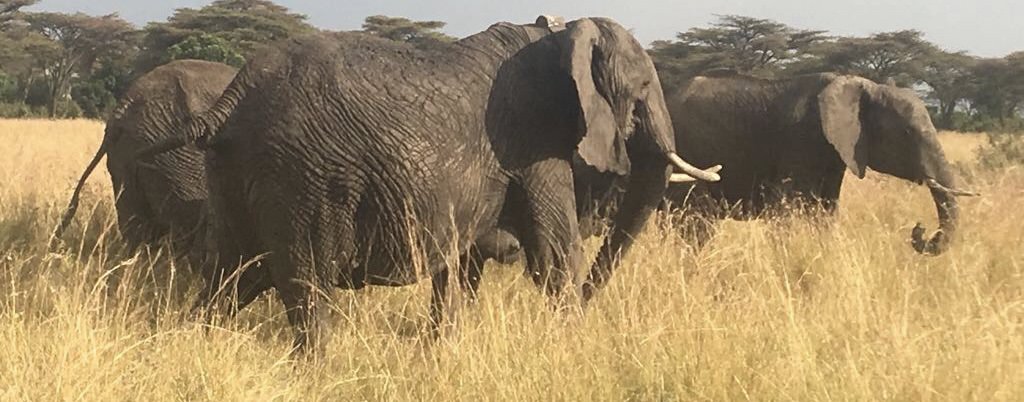 The first picture of Hangzhou.
The first picture of Hangzhou.


